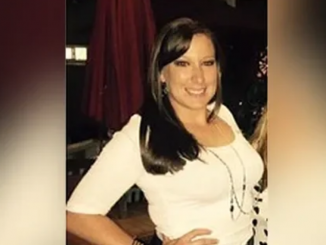
An Oregon woman is suing carers for approving her woman-to-man breast removal surgery after only brief Zoom meetings, blasting an ‘abhorrent misdiagnosis’ that left her ‘mutilated’ and unable to breastfeed.
Camille Kiefel says she quickly regretted getting a double mastectomy in August 2020, and that clinicians at two Oregon centers for gender-affirming care shouldn’t have green-lighted the procedure.
The 32-year-old is suing social worker Amy Ruff, mental health therapist Mara Burmeister, other unnamed medics, and Brave Space Oregon and the Quest Center for Integrative Health — two Portland-based centers for trans care.
In the complaint, filed with Oregon State Courts, Kiefel accuses her care team of ‘reckless abuse’ of their ‘positions of trust and authority as mental health professionals.’
She’s ‘still suffering extreme, excruciating, severe emotional distress including but not limited to feelings of betrayal by mental health professionals, humiliation, distress, and anxiety over having lost her breasts’, says the 13-page document.
She also endures ‘living with a permanently scarred, disfigured, and physically painful or discomfiting chest, and deep feelings of regret over unnecessarily and permanently losing her choice ever to breastfeed a child.’
According to court papers, Kiefel suffered various mental health issues as a child and teenager, eventually identifying as non-binary in 2016 and feeling ‘distress’ about her breasts. She believed a double mastectomy would solve her problems.
She had a one-hour Zoom session with Ruff in May 2020 and then a 40-minute video call with Burmeister in July, after which both experts wrote recommendations that Kiefel undergo chest-reduction surgery, says the complaint.
Kiefel says her carers should have spent more time reviewing her case and history of mental health problems, instead of effectively rubber-stamping a ‘life-altering, physically damaging, irreversible’ operation.
Burmeister’s referral letter even used ‘cut-and-pasted boilerplate’ language on people seeking sex-change operations rather than describing the particulars of Kiefel’s case, she alleges.
She went under the knife in August 2020, but it did not solve Kiefel’s problems and by May 2022 she realized the surgery had been a mistake, that she didn’t need to transition and that she could tackle her problems with talking therapy.
The defendants ‘transgressed the bounds of socially tolerable conduct by abusing their positions of trust and authority’ by recommending ‘unnecessary, irreversible treatment’ without weighing Kiefel’s mental problems, says the complaint.
Because of the surgery, Kiefel must endure a ‘lifelong inability ever to choose to breastfeed a child’ and doubts she will ever find a ‘life partner sexually and romantically attracted to a woman without breasts,’ it adds.
Kiefel has called for a jury trial and seeks up to $850,000 in damages.
David Mepham, the lawyer for Burmeister and the Quest Center, said the group’s ’employees always strive to provide quality services for their clients, and we believe that was done in this matter. It is our intent to fully defend this case.’
Kate Kauffman, the owner of Brave Space, said the organization ‘respects the privacy of all current and former clients and does not comment on pending litigation’.
In public appearances, Kiefel has spoken more vehemently about her care. Addressing a medical board in Florida last month, she railed against a misdiagnosis that left her with a ‘mutilated’ and ‘carved-up body.’
Like other young women who seek to transition and later came to regret it, Kiefel describes her sex change operation as a ‘way for me to escape womanhood’ and the social pressures women face nowadays.
‘The surgery was an abhorrent misdiagnosis — the goal of health care should always be to get to the root cause of the problem,’ she said.
‘Where my breasts were are hollow. I can never get them back. I can never fit a dress the same way again. I can never breastfeed. Who will love me?’
The case comes amid concerns about the number of young women with mental health issues who feel that transitioning to men will solve their problems, only to later regret procedures and seek to ‘de-transition’, as the reversal process is known.
Kiefel’s case has been financed by the Women’s Liberation Front, a feminist group that backs several civil suits against clinicians who fast-track women into sex change operations when therapy is a better option.
‘It is incredibly harmful for counselors to encourage their clients to amputate totally healthy body parts or fundamentally change their bodies, simply in order to conform to sexist stereotypes,’ the group’s director Mahri Irvine told DailyMail.com.
‘Counselors should be working with clients to find healthy ways to cope with identity issues, rather than encouraging them to permanently modify their bodies.’
‘Encouraging, in any way, a client to amputate totally healthy body parts, or fundamentally change their physical body, to conform to social stereotypes is an incredibly harmful thing to do,’ ‘It is not supportive, and it might appear to be supportive in the moment, but there’s no thinking about that client’s long term success in life and long term health.’
For those experiencing gender dysphoria — the distress felt due to a mismatch between biological sex and gender identity — transitioning with cross-sex hormones and surgery can be life-changing and beneficial.
Yet some experts warn against providing irreversible treatments, particularly to adolescents, pointing to growing numbers who come to regret procedures and seek to de-transition.
Statistics on this issue are contested, but there does appear to be a rise in the number of young people seeking to transition, and studies suggest that online social media and peer groups play a role in the uptick.
Experts are divided over the rise and its likely causes. Many link it to growing understanding and acceptance of gender dysphoria, others liken it to a ‘contagion’ or fad driven by peers and social media.
* Article from: dailymail.co.uk


